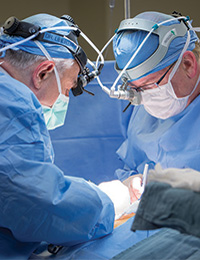 The patient, from Maine, was diagnosed with renal cancer with bilateral tumors and was referred to John Libertino, MD, the urologic surgeon who directs Emerson Urology Associates. In October, Dr. Libertino and Jason Gee, MD, a surgeon in the practice, performed a partial nephrectomy. Such cases are becoming more common at Emerson.
The patient, from Maine, was diagnosed with renal cancer with bilateral tumors and was referred to John Libertino, MD, the urologic surgeon who directs Emerson Urology Associates. In October, Dr. Libertino and Jason Gee, MD, a surgeon in the practice, performed a partial nephrectomy. Such cases are becoming more common at Emerson.
During the past year, those who work in radiology, the operating room (OR), the intensive care unit, on patient units and in other clinical areas have cared for a steady stream of patients who have come to Emerson for complex urologic surgery. Between July 2016 and July 2017, approximately 100 major open, complex urologic cases, mostly oncology, were performed. During the prior year, just eight such cases occurred at Emerson.
“Of those 100 patients, 59 percent came from outside of Emerson’s service area, 29 percent from out of state, and a handful from outside the U.S.,” notes Dr. Libertino, who joined Emerson in 2016. “We are seeing people with bilateral tumors and cases where we perform bench surgery — taking the kidney out, perfusing it, removing the tumor and putting it back into the patient. The word is out there that we’re here, and we can handle the difficult cases.”
Such cases require a high degree of surgical expertise and depend on a large number of people who are experienced at getting patients through long operations and inpatient stays. “We have a great team here,” says Dr. Libertino, who appreciates the collaborative efforts. “Any time there’s a complicated case, we sit down with the anesthesia staff to discuss it with them in advance. The entire OR team are on top of everything.”
The practice provides general urological care to men and women and highly-specialized care, including the most complex oncology cases. Dr. Libertino’s clinical focus is renal cancer, and Dr. Gee’s is mainly bladder cancer. They perform advanced surgical reconstruction of the urinary tract, including creation of an orthotopic neo-bladder using the patient’s intestines. Emerson Urology Associates includes Paul LaFontaine, MD, and Stephen Schloss, MD — each of whom provides general urology care and specialty care. All care for patients with prostate cancer.
Expertise is fueled by ongoing research
Dr. Libertino has performed surgery for more than four decades and continues to innovate. Supported by additional vascular surgery training, he has the largest experience operating on patients whose kidney cancer has grown into the vena cava. He helped develop the non-clamping, non-ischemic surgical techniques used in partial nephrectomies, which traditionally included clamping the artery.
“You cause ischemic damage to the kidney when you clamp the artery,” he explains. “With laparoscopic surgery, where you have to clamp the artery, patients may progress to chronic kidney disease over a period of ten years.” Dr. Libertino developed a way to operate on the kidney without clamping the artery, a technique that is important in patients with pre-existing kidney disease.
Dr. Gee has a long-standing interest in bladder cancer prevention. He participated in a research trial to assess the possibility of home screening for bladder cancer using a urine assay. “It may have a role to play in high-risk individuals, such as patients with a history of smoking or radiation exposure,” he explains.
He also served as principal investigator on an NIH trial that looked at the ability of ECGC, a green tea catechin, to produce favorable molecular changes in patients with bladder tumors. “We evaluated ECGC, purified into pill form, on the molecular level and determined that there were beneficial changes in those taking the nutrient vs. placebo,” he says. Dr. Gee now serves as co-editor on the second edition of Renal Cancer, one of many textbooks authored by Dr. Libertino.
Dr. Libertino is fueled by new research opportunities and confident about the comprehensive clinical expertise in urology at Emerson — and with the outstanding care that patients receive. “There is no reason for patients to go anywhere else for complex urologic surgery,” he says.

